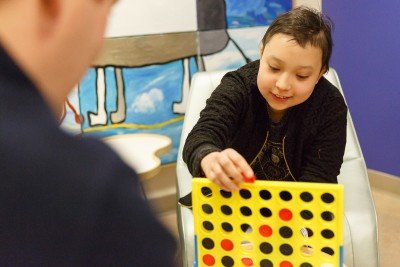Ezzy’s Story
When chemotherapy couldn’t get Esmeralda Pineda’s pediatric leukemia under control, doctors at Memorial Sloan Kettering turned to immunotherapy. The successful treatment wiped out all signs of her disease, and one year later, she’s still cancer free.

- Esmeralda Pineda was diagnosed with leukemia in 2015.
- She underwent multiple rounds of chemotherapy at her local hospital, but her cancer resisted.
- Ezzy and her family came to MSK for a new type of treatment that would use her own cells against the leukemia called CAR T cell therapy.
- To keep her healthy, Ezzy then underwent a bone marrow transplant.
- Now, she is home, cancer free, and back to enjoying life.
Like other preteen girls, Esmeralda Pineda loves Snapchat, Bruno Mars, and playing soccer. But in 2015, doctors weren’t sure if Esmeralda — or Ezzy, for short — would be able to enjoy these simple pleasures of childhood for much longer.
In July of that year, when she was 11, she was diagnosed with B cell acute lymphoblastic leukemia (ALL) in a Long Island emergency room. Making sense of the diagnosis proved challenging on multiple levels. It was particularly shocking to Ezzy and her family because the first doctor they saw said that her dizziness, bruising, and nosebleeds were just a part of being a kid. For her parents, Maria and Jose, the news was made all the more complicated by the fact that they are not fluent in English.
“[The doctor] said it’s a sickness but never told me it was cancer, so I was like, Oh, OK, I’ll be fine in a couple of months,” Ezzy recalls. “Then I found out it’s cancer and I wouldn’t be going back to school that year. I was scared because I didn’t know if I was going to live. A lot of people say cancer is bad.”
But there was hope: Chemotherapy is effective in nearly all children with ALL, so the Pineda family didn’t hesitate to start Ezzy on the treatment at the children’s hospital near their home on Long Island. Unfortunately, Ezzy’s case was different: Her cancer didn’t respond to three rounds of intensive chemotherapy treatment.
“Leukemia should respond after chemotherapy,” says Kevin Curran, one of the doctors who took over Ezzy’s care at Memorial Sloan Kettering. “Unfortunately, hers did not. The expected cure rate went from 90% to less than 30%. That’s when her doctors on Long Island called me.”
The First Meeting
Ezzy came to MSK’s Pediatrics Service in November 2015. Dr. Curran vividly remembers their first meeting.
“She was an adorable, precocious girl who was — as she is now — full of life and ready to fight,” Dr. Curran recalls. “She knew she had a serious condition and she always had that drive to push forward.”
In order to understand why Ezzy didn’t respond to chemotherapy, Dr. Curran asked her to undergo molecular testing. The test results showed that Ezzy’s cancer carried a unique genetic signature that made her particular disease resistant to traditional treatments. Thankfully, Dr. Curran had an idea up his sleeve.
“We told Ezzy we could treat her leukemia using her own cells,” he recalls.
That’s the crux of immunotherapy, a promising form of cancer treatment that uses the body’s own immune system to fight cancer. Dr. Curran suspected that a type of immunotherapy called chimeric antigen receptor (CAR) T cell therapy — in which a patient’s T cells are collected, genetically modified in a lab, and then given back to the patient — could knock out the cancer cells that chemotherapy couldn’t.
With help from an MSK translator, Dr. Curran explained to Ezzy and her parents that she could undergo CAR T cell therapy as part of a clinical trial, which offers patients new drugs and therapies before they’re widely available. Because the treatment was still in the early phase, there was some risk involved. But that didn’t faze the family: They signed Ezzy up right away.
Her determination wowed Dr. Curran. “You couldn’t ask for a braver, more willing patient,” he says. “You have to be very forthright, and with children, think about how to explain it to them in a way that makes sense. We have to earn our patients’ trust, and we ask them to take a leap of faith with us. Ezzy was brave and ready to try this.”
Making the CAR Go
In March 2016, Ezzy spent three hours in MSK’s blood donor room to have her white blood cells and T cells collected. Those isolated cells were then sent to the lab to be beefed up with cancer-fighting proteins and made into CAR T cells. Two weeks later, Ezzy came to Memorial Hospital to receive her new cells. The only immediate side effect she experienced was a fever — which was actually a promising sign that the treatment was doing its job, Dr. Curran says.
“A fever means your immune system is working, and if your immune system is working, we think that the T cells could be fighting the cancer,” he recalls.
Still, Dr. Curran didn’t want to get his — or Ezzy’s — hopes up. It would be another two weeks before he would know for certain if the treatment had worked. When it was finally time to check Ezzy’s bone marrow for signs of disease, what Dr. Curran and his team saw was hard to believe: no evidence of cancer. A month later, Ezzy was in full remission. Her blood counts had returned to normal levels.
Ezzy Gets Even Stronger
The CAR T treatment proved to be a massive success. It was the first time since her initial diagnosis that Ezzy had been in remission. But CAR T cells don’t last forever, and Dr. Curran wanted to keep Ezzy healthy for as long as possible, so he recommended a bone marrow transplant. He worked with Nancy Kernan, Assistant Chief of MSK’s Pediatric Bone Marrow Transplant Service, to set up the transplant for April 2016.
It was a difficult experience, Ezzy recalls — “totally harder than the CAR T cells,” she says.
As is often the case with bone marrow transplants, it took some time for Ezzy’s body to get used to its new immune system. She stayed in the hospital for two months, which included some time in the intensive care unit. But this proved to be just another obstacle she would overcome.
“It just seems that whatever challenge is thrown her way, she rises to meet it,” Dr. Kernan says.
Paying It Forward
Ezzy’s time in the hospital was peppered with bright spots. While there, she met another leukemia patient, Ana Lucia, who was also a native Spanish speaker. They became fast friends, and Ezzy was always there to support Ana Lucia whenever she needed it.
“Every time they gave her a shot, I always asked if she wanted to hold my hand,” Ezzy recalls. “I told her to squeeze my hand as hard as you want, so she’d hold my hand and I’d tell the nurse, ‘Just do it fast!’”
Now, Ezzy is home, where she continues to heal. She comes back to check in with Dr. Kernan once a week.
“She comes in to clinic with a great attitude,” says Dr. Kernan. “She is a fabulous historian: She tells me exactly what has happened in the previous week and she gives me notes. She’s smart and just plain spunky.”
Ezzy was able to finish out the school year with help from a home tutor. She plans to return to school next year for eighth grade. Dr. Curran says he expects her to live a long, healthy life filled with family, friends, and fun.
Ezzy is thinking about her future, too. She’s known for years that she wants to help people as a nurse one day — a goal that was strengthened by her experience with cancer. She even knows what she’ll say to her future young patients going through a difficult time.
“Don’t be scared,” she’ll say. “Because I’ve gone through the same thing.”



